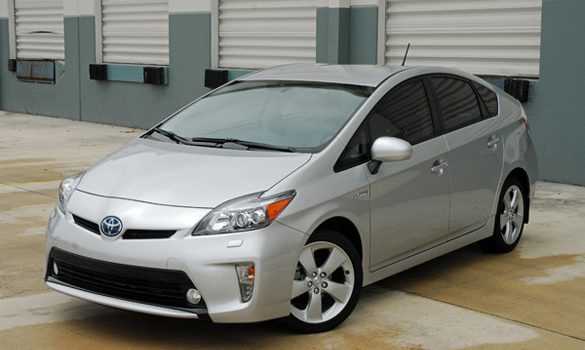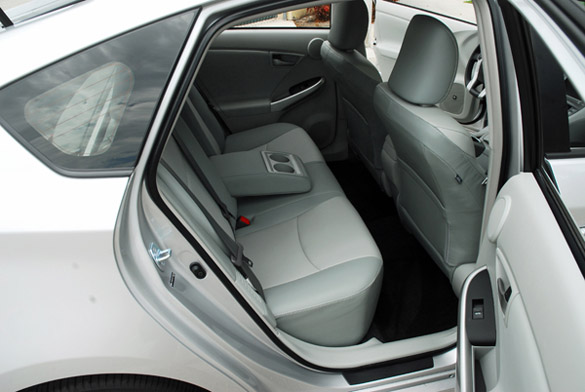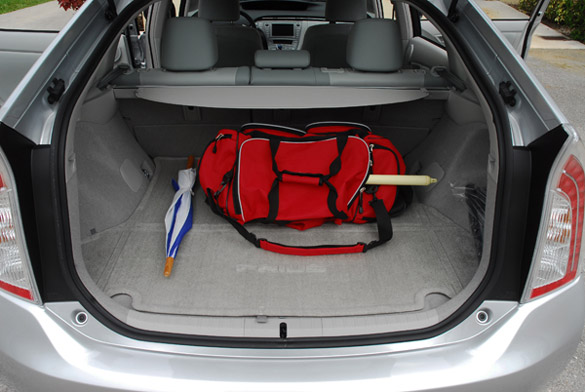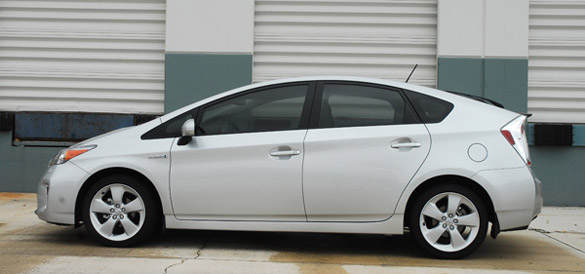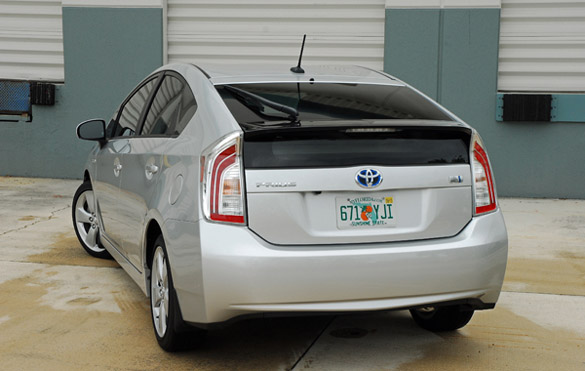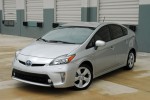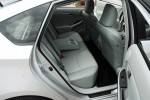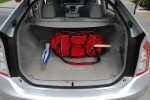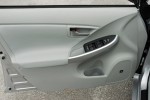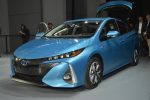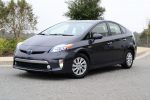First introduced in 2001, the Toyota Prius has been a tremendous success in the hybrid world with segment leading sales figures of more than 2-million units sold. For 2012, Toyota is upping the ante by introducing 3-new models. The Prius C is smaller, has a higher MPG spec of 53 combined, while the new V model is larger than the standard Prius and is more versatile and comfortable. The other new model is the Plug-in with an EV only mileage rating of 15 miles at up to 62mph. If you only drive up to 15 miles a day you’ll never have to put gasoline into your Prius.
The new Prius model still expresses the vehicle’s versatility meets the need of growing families, singles and couples with active lifestyles while providing the same attributes traditionally found in the Prius DNA. Despite the spaciousness of a family friendly midsize vehicle, the Prius delivers fuel economy ratings of 51mpg/city, and 48mpg/highway.
The Prius brings leading-edge hybrid technology to customers who need more room and provides more cargo space than 80% of all small SUVs. The Prius emphasizes overall proportions with spaciousness and flexibility for active consumers. Comfortable interior space and good visibility have been assisted by a high seating position, ample headroom, and an impressive 38 inch couple distance, providing generous rear legroom. A low, wide-opening rear hatch reveals 34.3 cu.ft. of cargo space behind the rear seats, making it the most spacious dedicated hybrid vehicle on the market.
Comfortable seating for five is specifically designed for young families. Sliding second row seats allow for easier ingress and rear-storage flexibility, with a 45-degree recline for greater comfort. The 60/40 split folding rear seats present four different seat arrangements that provide excellent usability for passengers and luggage, while a fold-flat front passenger seat back allows for extremely long cargo.
Inside you are kept informed via a center-mounted instrument panel, a visually succinct, space-efficient design that is also exceptionally user-friendly and this year an optional ‘head’s-up’ display for added safety. As with other Prius models, the driving controls including the push buttons start/stop, parking switch, drive-by-wire shift toggle and driving mode buttons are right at your hands. Each of these driving control features are distinguished by silver trim. Instrument panel controls, including a single dial automatic climate control, provide an advanced look and user-friendly command. The center console is accessible from both the driver side and rear seats. The console is big enough to hold 23-CD cases, yet low enough so that lines of sight and conversation between passengers can be relaxed and natural. The console design helps make the cabin a human-friendly space, and a low-fatigue environment for long rides. A wide variety of engineered storage spaces are located throughout the cabin. These include dual glove boxes, a center console utility tray and five cupholders in large and medium sizes. Bottle holders are built into the front and rear door pockets, while most models feature an overhead storage space suitable for sunglasses. In addition to the larger main luggage compartment there are storage units built into the sides and under the cargo platform for storing equipment such as car wash items or gloves. Even a special space for umbrellas is located under the second row of seats. The rear seats fold, slide and recline. New this year is seat material call SofTex is designed for easy cleaning, resisting spills and wear in a family vehicle that could see heavy use on a daily basis. Soft to the touch, SofTex’s attributes as compared to leather and other traditional leatherette-type materials include a weight reduction of 50%, a manufacturing process with approximately 99% fewer volatile organic compounds than conventional synthetic leather, and it’s water and stain resistant. It also does not include any animal-based material.
Seamlessly integrated into the new Prius are state-of-the-art electronics and enhanced connectivity features. A Bluetooth wireless connection for compatible for hands-free phone calls is standard, now improved by an automatic phone book transfer function. Also standard now is an improved automatic phone book transfer function. Also standard is a USB port that allows playing of music and video from portable audio devices, using the vehicle sound system and in-dash display screen, including full iPod integration.
The standard audio system has a 6.1 inch screen and six speakers. The screen also displays energy monitor and fuel consumption data, and functions as the monitor for the integrated back-up camera and the Display Audio System. The screen also offers a new value-driven navigation system and serves as a portal for Entune. An available HD radio system enables CD sound quality for digital FM broadcasts, and has features that maximize analog and AM broadcast sound quality. The system includes HD radio with iTunes tagging for future purchase and SIRIUS satellite radio. The ‘top-of-the-line’ audio is equipped with a new seven-inch Premium HDD Navigation system with Entune and JBL speakers. This system offers a new ‘split-screen’ feature that allows for simultaneously displaying navigation and audio info and full iPod video integration. The premium system adds a new JBL GreenEdge audio system that combines an eight-channel amplifier and door mounted ‘acoustic lens’ speakers to provide a high-quality sound. The GreenEdge amplifier achieves a 66% reduction in overall mass and a 50% enhancement in sound efficiency. The GreenEdge speakers produce a higher output of sound with the same power or less consumption of conventional models. It sounds clean and loud with the windows down cruising down the road.
The new Prius is one of the first Toyota models to offer the Entune multimedia system. For the first time ever in a Toyota automobile, this innovative new system leverages the mobile smartphone to provide a richer in-vehicle experience with fully integrated access to navigation, entertainment and information services. Entune debuts the first ever support for engaging mobile apps, such as Bing, OpenTable, and movietickets.com, along with accessing useful travel-related services such as live weather, traffic, fuel information-location/price, stocks and sports. Entune brings the largest selection of music options available to a vehicle including heartradio’s 750+ stations, and Pandora’s personalized music service. It also features an advanced voice-recognition system that helps you to stay focused on driving by eliminating the need to memorize thousands of voice commands.
With a balance between outstanding spaciousness, refined style and smooth aerodynamics, Prius has a low 0.29 coefficient of drag, which does not inhibit the vehicle’s convenient packaging. It is a new vehicle from the ground up, with a shape that evolved from Prius rather than being an elongated version. Keeping air resistance low is the familiar triangular Prius silhouette, adapted to a larger size. A flush surface from the front of the vehicle through the front pillars work with side ‘aerocorners’ for exceptionally clean airflow. The smooth front sheetmetal blends into a carefully designed roof and cabin, leading to an optimized cabin-end shape that acts to converge side and roof airflow. Wheels and wheel caps are designed with aerodynamic effects in mind and lessen windnoise.
Enhancing the clean, low wind-resistance design are materials that keep the new Prius relatively light and easy to move. The door panels are foam-injected with polypropylene and the deck board with light-weight urethane to produce a weight savings of 20%. Significant weight reduction is also achieved through the use of high-tensile grades of steel throughout the body along with aluminum in key body panels and systems, their other benefits ensure a light, yet highly rigid platform structure for a smooth, quiet and controlled ride.
Also available and a Toyota-first, is a resin Panoramic View Moonroof with power retractable sun shades that provides an open atmosphere in the cabin with a 40% reduction in weight as compared to conventional glass roofs of the same size, and excellent heat insulation performance. I didn’t have this option in my test Prius Five but I’m sure that it really lets the sun shine in to give the entire interior a more spacious feel. Also optional are LED headlamps that work to improve visibility while reducing current draw on the battery. They used projector lenses for long-range outlook and are designed to be virtually maintenance free for the life of the car. Prius also features a new climate control system with enhanced cooling capability to cope with the larger cabin. The system uses an electric compressor so that the A/C can run without depending on the engine, and improved component design for better maximum-demand cooling performance.
The Hybrid Synergy Drive system in the Prius is essentially the same as the current third-generation Prius. The system uses to high-output motors, one 60KW (80hp) unit that mainly works to power the compact, lightweight transaxle and another smaller motor that mainly works as the electric power source. Maximum motor drive voltage is 650 volts DC. The proven and practical nickel-metal hydride battery pack is the same as on the third-generation Prius liftback, but with a cooling duct located under the rear seat.
As with current-generation Prius cars, Hybrid Synergy Drive is a series-parallel hybrid system that can provide power either from the engine alone, or the motor along, or any mix of both. A hybrid control computer manages the system so that optimum power is delivered according to driver demand. It is seamless and uses a start/stop system and regenerative braking to conserve fuel and recharge the battery upon deceleration.
Hybrid Synergy Drive is built around a specially adapted, efficient 98hp 1.8 liter four-cylinder engine that runs on the Atkinson cycle and contributes to a total system horsepower of 134. Key components include and electric water pump that requires no belts, and an exhaust gas recirculation system that helps warm the engine quickly, reducing fuel consumption when the engine is cold. Compact and light weight, the engine produces minimal noise and vibration. Sophisticated valve control, injector design and other technologies reduce emissions to allow the Prius to qualify for SULEV and Tier 2 Bin 3 emissions standards. It is a great system that amazed me with its quietness and excellent power delivery at my command because of the different driving modes depending on how you want to drive the new Prius.
In addition to the standard driving mode, Prius also adds an Eco driving mode when you are not in a hurry or want the optimal mpg, and EV mode for electric only propulsion that is only advised for up to a few miles, and a Power mode that really makes driving more fun and exciting, yes even in a hybrid. In this mode, the mid-range response is enhanced for quicker initial acceleration, faster passing other vehicles on the highways and when driving up slopes and mountainous terrain. In Power mode the power and acceleration felt like a larger inline four-cylinder engine under the hood.
A new feature, Pitch and Bounce Control, works with suspension enhancements to improve ride comfort and control. Front coil-over spring and damper capacities have been significantly increased and a new upper support has been designed. The steering gear has been attached to the front suspension member for more rigidity and feel, and the stabilizer bar has been repositioned for even more responsive steering feel and enhanced ride comfort. In the rear, a torsion-beam suspension design has been fitted with appropriately tuned springs and dampers. The new rear suspension setup is designed to help ensure stability and ride comfort, and it has a lower mounting point to improve luggage space. Pitch and Bounce Control uses the torque of the hybrid motor to enhance ride comfort and control. The System, working with wheel-speed sensors and in tune with the suspension, helps suppress bounce and toss motions to improve comfort for all occupants, and because it helps control the balance and posture of the new Prius as a whole, it also functions to improve handling response. The Prius rides on 16X6.5 inch wheels and tires, plus my test Prius Five trim level came shod with the optional 17X7 inch alloy wheels and low-resistance summer tires. The new Prius Five is the best handling and most responsive of any Prius that I have tested in the past.
Standard features in my loaded test Prius Five not mentioned above includes a rear spoiler, foglamps, headlamp washers, power folding, heated outside mirrors, front variable and rear intermittent wipers/washers, heated front seats with driver’s side power adjustments/lumbar, tilt/telescopic leather wrapped steering wheel with cruise control/audio control buttons, center console with dual tiered storage box/dual cupholders up front/rear pull down armrest with dual cupholders, dual map lamps, dual, lighted vanity mirrors, door storage slots up front, grab handles above each door, auto dimming rearview mirror, Homelink, 2-front power outlets, 60/40 split rear seats, dual automatic climate control and front/rear floor mats.
Standard safety features include vehicle stability control, traction control, ABS, EBD, BA, Smart Stop Technology, front /rear safety belts with front load limiters/pretensioners, front dual airbags, side-impact airbags, front/rear side curtain airbags, front/rear crumple zones, steel beams in each door, LATCH system for child seats, remote keyless entry, engine immobilizer, and a tire pressure monitoring system. Safety options include Dynamic Radar cruise control with pre-braking system, Lane Keep Assist, Safety Connect to alert Toyota when the vehicle’s airbags are deployed, and a stolen vehicle locator.
With the new Prius Five, more standard and optional equipment and four-driving modes, you’re driving times are only enhanced with higher MPG stats not found with any other 4-cylinder gasoline engine vehicle. With prices starting at just $29,805.00 you’ll start saving money right away and wont’ give up any of the pleasures that you associate with a drive in the city or country.
COPYRIGHT:2012:HARVEY SCHWARTZ
SPECIFICATIONS
- Price: Base Prius One trim level MSRP $23,015 Prius Five trim level MSRP $29,805
- Engine: 1.8-liter gas engine with hybrid synergy drive electric motor – total 134 horsepower @ 5,200 rpm/105 ft-lbs. torque @ 4000 rpm
- Turning circle: 36.0 ft.
- Total length: 176.4 in.
- Total width: 68.7 in.
- Total height: 58.7 in.
- Track: f/r-59.6/59.4 in.
- Ground clearance: 5.3 in.
- Headroom: f/r-38.6/37.6 in.
- Legroom: f/r-42.5/36.0 in.
- EPA interior volume: 115.3 cu.ft.
- EPA cargo volume: with rear seats up-21.6/with rear seats folded-39.6 cu.ft.
- Fuel tank: 11.9 gallon
- Curb weight: 3,042 lbs.
- EPA mileage est.: 51 mpg city / 48 mpg highway
- 0-60 mph: 10.1 seconds
